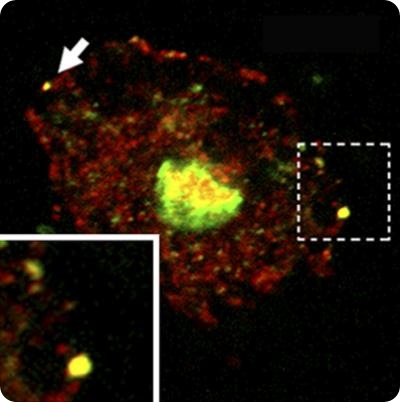Jul 27 2009
Not satisfied with simply thwarting its host's defensive maneuvers, HIV actually twists one to its advantage, based on new findings from Kyei et al. in the July 27, 2009 issue of the Journal of Cell Biology. Vojo Deretic and colleagues suggest that autophagy - a stress response process - helps HIV to proliferate and that conversely, blocking autophagy lessens HIV production.
Reduced HIV levels were accompanied by a blockade in the processing of Gag - a key precursor protein for HIV assembly. Gag in fact localized to complexes containing an autophagy protein, LC3. "It looked paradoxical," says Deretic. "But only if you didn't know something else. And that is a finding in yeast that autophagy is not only degradative, but can also serve in some biosynthetic pathways," including the trafficking of the Cvt protein to the vacuole. Together, the results suggest that Gag may piggyback on autophagosomes or their components, perhaps for locomotive services, to complete its maturation.
The group then sought the viral agitator that blocks autophagosome maturation and allows Gag processing. Their primary candidate was HIV protein Nef, which interacts with the vacuolar proton ATPase and might thereby block acidification steps necessary to make a degradative organelle. Using a mutant virus, the group showed that HIV lacking Nef no longer profited from increased autophagy and was instead degraded. It is not yet clear exactly how Nef blocks autophagosome maturation. 
Clinical applications may be far down the road. If the idea is to kill the virus using drugs such as rapamycin, which induces autophagy, it will first be necessary to block Nef, notes Deretic. The idea is not without natural support. "There were cases in Australia involving HIV strains that lacked Nef," he says. "And these people would not progress to AIDS, meaning the virus is disabled."
Deretic has other exciting ideas. Highly active anti-retroviral therapy often does a smashing job clearing viral loads from the blood. But the pathogen can persist in particular locales such as gut lymphoid tissue. "My hope," says Deretic, "is to go after these reservoirs and chew up the virus that for some reason is not readily accessible or susceptible to the anti-retroviral therapy. I have great hope that autophagy will help us with that. This is something we didn't have on our radar screens just five years ago."